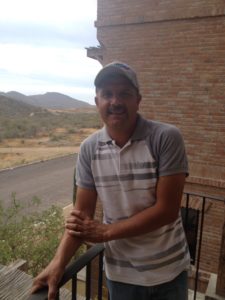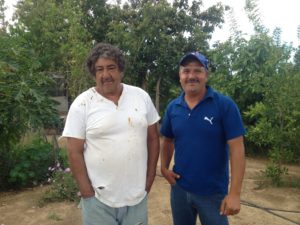Para leer en español, haga clic aquí
Name: Miguel Angel Leon Amador
Position: Community Liaison, CSU Center in Todos Santos
What is your profession?
I am an agronomist by profession.
How long have you lived in Todos Santos?
I have lived in Todos Santos all my life, 40 years.
What is your role with the CSU Center?
My role has been to be a liaison with local producers, ejidarios, farmers (chili producers), and ranchers.
I have introduced students and faculty from CSU to various communities and individuals, and have taught uses of native plants and the different ranch actives.
I also helped communicate difficulties ranchers have with their livestock to groups of veterinarians to assist in the creation of a livestock health assessment.
What is your favorite part or what do you like most in the community of Todos Santos?

I really like the dawn in my town. The first thing I do in the morning is to walk with my cup of coffee and with my dogs to take in the morning.
Also the native people and the weather are wonderful.
What would you like to let people know about CSU’s involvement in Todos Santos and / or Todos Santos in general?
I would not change my town for another place, I love its tranquility, its people, its climate, its ranches. It is an incredible town.
I would like the people of the town to know the origin of CSU in Todos Santos, and especially about the different programs for the community. The programs they offer to the community are of great importance.
About the CSU Todos Santos Center
The Colorado State University Todos Santos Center is the university’s first international location and is core to CSU’s mission of teaching, research, service, and outreach.
The Center provides opportunities for CSU students and Baja California Sur residents to collaborate with local partners and businesses to identify needs, conduct research, and produce impactful outcomes.
CSU’s vision in Todos Santos is to cultivate generations of global citizens and to be a part of creating thriving communities through collaboration, experience, and exchange of knowledge in areas such as agriculture, infectious disease, elementary education, environmental and social sustainability, wildlife ecology, veterinary medicine, and public health.